![]()
![]()
BALAAM (Part 1)
Preview
The Story of Balaam
LUST
Lust of the Soul
Lust Problems
The Divine Solution
BALAAM (Part 2)
Balaam Tries to Curse Israel
The Baal Curse
Balaam was a Gentile prophet, whose prophesies are recorded in scripture. He even predicted the Star of Bethlehem. However, his love of the world became the source of his infamy. Balaam loved money, prostitution, and worldly fame. He was famous as a soothsayer, who would pronounce a curse for money. The Mosaic Law strictly prohibited these practices, but then, Balaam wasn't a Jew. He was a Gentile. Balaam was a dichotomy who spoke with the authority of God at times and used the power of demonism at other times.
Balaam was the classic case of the worldly prophet. He was so overcome by worldliness that his values reflected not the Righteousness of God but the corruption of the lusts of the flesh. When the lusts of the flesh replace the love of God, the believer travels down the path of reversionism. Balaam was the epitome of the reversionist. He is the classic example of a person who knew the right way, but rejected it to pursue the Frantic Search for Happiness of worldly lusts.
When prophets or Church Age pastors enter into reversionism, they are doubly destructive. Not only do they hurt themselves, but they lead others astray. Balaam was responsible for the death of 24,000 Jews. He was the pawn of Baal. He was the friend of anti-Semitism, the unfaithful servant, and corrupt prophet. His reversionism was so perverse, that his own donkey was used to preach him a sermon in an attempt to restrain his reversionistic insanity. His infamy was so great that throughout history the mere mention of the name Balaam was a cause for insult. In the epistles to the Church, Peter uses him as an example of the reversionist, and the Lord Jesus Christ uses him as an example of the apostasy in the Church at Pergammon (Revelation 2:14).
Why study Balaam? Because the story of Balaam is as relevant today as any other time in history. Just as prophets like Balaam existed in Moses' day, pastors exist in the Church Age with a striking similarity. Today the apostasy of Balaam is everywhere. It fills the pulpits of apostate churches all over the world. Unlike Balaam, however, the pastors of today do not have the luxury of a talking donkey to awaken them from their own apostasy. Unless they have a near-death experience or some other shock to wake them up, most of them continue to operate as Balaam in the power of the Cosmic System. They don't know the meaning of grace. They have no concept of experiential sanctification, and they are slaves to the devil's world.
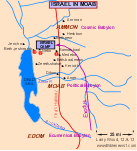 Prior
to entering the Promised Land, the nation of Israel camped on the steppes
of Moab northwest of Mount Nebo. Israel had just defeated the Amorites,
who occupied all of the land between Moab and Ammon from the River Arnon
to the Jabbok (Numbers 21:23-26). So
Israel had won most of the land east of the Jordan except for Edom and
Moab. The Arnon River is on the east side of the Dead Sea.
At the time Ammon had been occupying the land of Moab north of the Arnon
River. When Balak, the king of Moab, saw Israel's camp on his doorstep,
he panicked and began searching frantically for a solution to the crisis.
Balak was an astute king, although he was an unbeliever. Being without
the military muscle to defend his nation against the powerful Army of Israel,
he racked his brain for an alternative solution. Then he hit upon
the idea of using the curse of demonism to ward off the Jews. The
national religion of Moab was the worship of Baal, so the idea is not so
surprising.
Prior
to entering the Promised Land, the nation of Israel camped on the steppes
of Moab northwest of Mount Nebo. Israel had just defeated the Amorites,
who occupied all of the land between Moab and Ammon from the River Arnon
to the Jabbok (Numbers 21:23-26). So
Israel had won most of the land east of the Jordan except for Edom and
Moab. The Arnon River is on the east side of the Dead Sea.
At the time Ammon had been occupying the land of Moab north of the Arnon
River. When Balak, the king of Moab, saw Israel's camp on his doorstep,
he panicked and began searching frantically for a solution to the crisis.
Balak was an astute king, although he was an unbeliever. Being without
the military muscle to defend his nation against the powerful Army of Israel,
he racked his brain for an alternative solution. Then he hit upon
the idea of using the curse of demonism to ward off the Jews. The
national religion of Moab was the worship of Baal, so the idea is not so
surprising.
However, to perform the cursing, Balak did not call upon his own cult priests, but sent a delegation to the most famous soothsayer of his day, a prophet named Balaam, who lived in the region of Babylon, current day Iraq. At first Balaam refused the offer, but later when another, more prestigious delegation arrived from Moab and offered him more money, he agreed to return with them to Moab for the purpose of pronouncing a demonic curse on Israel. On the way he encountered reversionistic discipline that eventuated in a sermon from his own donkey. Balaam was highly embarrassed and earned the distinction of chief ass. Even the donkey had better sense than Balaam.
When Balaam arrived in Moab, he was greeted by King Balak. Together, they offered sacrifices of bulls and rams in order to secure backing from the spirit world for the curse of Israel. However, the Lord intervened and each time Balaam prophesied, he pronounced a blessing on Israel instead of a curse. After three attempts from three different locations, Balaam was able only to pronounce blessing on Israel and not a curse. Balak was upset, and Balaam was prevented from earning his handsome fee for divination.
However, this did not end the determination of Balaam to find a way to earn his fee, and he and Balak remained friends. Balaam soon hit upon the idea of a diplomatic initiative, or Peace Plan. He convinced Balak that the thing to do was to send a delegation of Moabite women, who were Baal worshippers, on a good-will visit to the Camp of Israel. When the men of Israel saw the alluring Moabite women, they fell for the bait. Israeli men were lured into Moab and became involved in the worship of Baal, which involved fornication and dining on the meat offered in sacrifices to Baal.
Israel, thus came under the influence of demonism under the power of Baal. The Client Nation which could not be destroyed from an outside military power, was undermined by transgression from within. God cursed Israel with a plague and 24,000 Jews died due to involvement in demonism. Balaam, thus earned his fee - not by directly cursing Israel, but by counseling Balaam in the art of diplomatic duplicity. In aiding the enemies of Israel, Balaam had succumbed to the most vile form of reversionism, anti-Semitism. For such activity, the Abrahamic Covenant pronounced the curse of God:
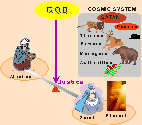 Baal
is one of Satan's powerful demons who is sent to influence the rulers of
some nations. The name, Baal, simply means lord and is synonymous
with a cosmic king or queen in the organization of Satan. (Illustration:
Spiritual
Warfare
of Sarah) Baal, like Satan, has a dichotomous nature. He rules as
both the god of war and the goddess of love. On the one hand he is
a vicious fighter like the god of war, and on the other hand, he is the
goddess of love, the sponsor of the Phallic Cult. The warlike side
demands child sacrifice, while the love goddess lures into the Phallic
Cult, sexual debauchery, and temple prostitution.
Baal
is one of Satan's powerful demons who is sent to influence the rulers of
some nations. The name, Baal, simply means lord and is synonymous
with a cosmic king or queen in the organization of Satan. (Illustration:
Spiritual
Warfare
of Sarah) Baal, like Satan, has a dichotomous nature. He rules as
both the god of war and the goddess of love. On the one hand he is
a vicious fighter like the god of war, and on the other hand, he is the
goddess of love, the sponsor of the Phallic Cult. The warlike side
demands child sacrifice, while the love goddess lures into the Phallic
Cult, sexual debauchery, and temple prostitution.
Baal is symbolized by the bear. This is learned from the story of Elisha, who was mocked by young boys. The boys followed Elisha and made fun of his bald head. Consequently, Elisha cursed them.
In Jeremiah's day, Baal worship also involved the suffering and sacrifice of children.
The bear is one of the symbols of Satan as the ruling power of an evil nation (Daniel 7:5; Revelation 13:2). The dictator of the Revived Roman Empire during the Tribulation will be symbolized by a beast with feet like a bear (Revelation 13:1-2). Today, a nation that is symbolized by the bear and, therefore Baal, is Russia (called Gog, Ezekiel 38:1-2; Revelation 20:8).
![]()
 Balaam
was a Gentile prophet who lived in Pethor (Deuteronomy
23:4), a city south of Carchemish in northern Mesopotamia (Iraq)
on the west bank of the Euphrates River (Numbers
22:5). Balaam did not know that the Lord had forbidden the
conquest of Moab (Deuteronomy 2:9).
When Israel camped on the plains of Moab prior to entering the Promised
Land, Balak, King of Moab, was in a panic. Since his nation wasn't
strong enough for a military confrontation with Israel and since Moab under
the power of Baal was full of anti-Semitism, he sent for Balaam, a famous
soothsayer, to pronounce a curse on Israel.
Balaam
was a Gentile prophet who lived in Pethor (Deuteronomy
23:4), a city south of Carchemish in northern Mesopotamia (Iraq)
on the west bank of the Euphrates River (Numbers
22:5). Balaam did not know that the Lord had forbidden the
conquest of Moab (Deuteronomy 2:9).
When Israel camped on the plains of Moab prior to entering the Promised
Land, Balak, King of Moab, was in a panic. Since his nation wasn't
strong enough for a military confrontation with Israel and since Moab under
the power of Baal was full of anti-Semitism, he sent for Balaam, a famous
soothsayer, to pronounce a curse on Israel.
Moab was the center of three countries that symbolized the counterattack from the Cosmic System.
|
|
|
|
| 1 Edom | Esau, ruddy | Ecumenical Babylon |
| 2 Moab | Son of Lot & oldest daughter | Political Babylon |
| 3 Ammon | Son of Lot & younger daughter | Cosmic Babylon |
Moab in Hebrew is derived from ba*m@ , meab, which means "from the father." The daughter of Lot who committed incest with her father named her son Moab, "from the father," in admission of the incestuous relationship.
Balak immediately held a conference with the leaders of Midian, who lived to the south of Edom. The Midianites were descendants of Abraham through Keturah (Genesis 25:1-6). They were a patriarchal society in which heads of the family ruled. These tribal heads (elders) were called princes (Hebrew sar) or kings for the more influential tribes. Rather than risk military defeat, Balak decided to try to invoke the powers of demonism to handle his current crisis.
When the messengers from the King of Moab arrived, Balaam was given an opportunity to earn a handsome fee for his shady dabbling in divination. Balaam knew the request was improper, but at the same time, he wanted to find a way to compromise his standards as a prophet for fame and fortune. Balaam asked the messengers to spend the night, and he would inquire of the Lord. The Lord, however, strictly forbad the request. So Balaam rejected the offer the next morning and refused to return with the messengers of Moab (Numbers 22:8-14).
Balak was not one to give up easily, however. So he sent another group of diplomats, who were more distinguished princes (tribal chiefs), to Balaam.
1. BALAAM'S DISTRACTION
Balaam was angry at his donkey and struck her to turn her back onto the path. Balaam was in the dark and confused about what had happened. The reversionist lacks enlightenment from the Holy Spirit. Balaam then became angry, the mental attitude sin of bitterness, and struck his donkey. He concluded it was all the donkey's fault. Many people think donkeys are stupid, but they usually have good reason for what they do. However, only a sensitive person can see it. People who try to bully the donkey and abuse it, do not understand animal behavior. When an animal does something strange, there may be a good reason. In Balaam's case, his donkey was taking evasive action, which saved his life; but Balaam in reversionism was too insensitive to notice.
Balaam in reversionism was blind spiritually due to scar tissue of the soul. He was insensitive to authority and the will of God. He was also insensitive to his donkey. The donkey saw the Lord, but the reversionist did not. Balaam had wondered off course from the authority of God and the donkey's trip into the field symbolized that. The consequence was warning discipline from the Lord.
The believer is expected to navigate by faith
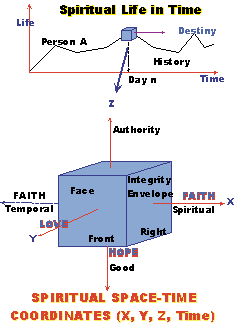 Deviation
from the path represents a problem on the Faith Axis (X-Axis) of the Space
Time Coordinate System. An injured foot will cause a problem
walking, which symbolizes a problem on the Faith Axis. The believer
must learn to walk by faith and navigate through spiritual straits.
Deviation
from the path represents a problem on the Faith Axis (X-Axis) of the Space
Time Coordinate System. An injured foot will cause a problem
walking, which symbolizes a problem on the Faith Axis. The believer
must learn to walk by faith and navigate through spiritual straits.
3. MOMENTUM TEST (CATEGORICAL DISCIPLINE)
Failing the momentum test is a Time Axis problem. Balaam's Time Axis problem was that the donkey slowed down and stopped. Problems on the Time Axis are often associated with jealousy. Such was the case with Balaam, who retaliated from jealous impatience, followed by anger, and unjust treatment of the donkey.
Behavior like that of Balaam's donkey has been observed in horses as noted by Passavant in reference to animal magnetism and clairvoyance, "That horses see it (the second sight), is evident from their violent and rapid snorting when their rider has had a vision of any kind either by day or night. And in the case of the horse, it may also be observed, that it will refuse to go any farther in the same road until a circuitous course has been taken, and even then, it is quite in a sweat."3 This is similar to what happened in John 12:28-30 when some people heard the voice from heaven and others thought they heard thunder.
The angel of the Lord had a drawn sword (verse 23), which represented capital punishment from the Supreme Court of Heaven. The Lord as the Judge of the Supreme Court of Heaven has the authority to execute capital punishment of the reversionist. Momentum Discipline is categorical discipline in that a category of judgments may be involved. In the case of Balaam, the Momentum Discipline was symbolic in that the donkey was forced to the ground and Balaam lacked momentum to continue his forward movement.
It does say that the Lord opened the mouth of the donkey; so the principle is probably established that even a "dumb ass can preach." The donkey here was a female, which is supposed to be the most docile. Whereas, the jack (male donkey) might be stubborn, the jenny (female donkey) would be faithful and subservient. Indeed, this was the case by Balaam's own admission; for the donkey asked him in verse 30 if she had ever been unfaithful, and Balaam admitted that she had not.
The donkey's speech was audible and rational; for the donkey recounted that she had been struck three times, and such conclusions require logical thought processes which are usually beyond the capabilities of animals. Balaam heard the donkey and answered her; but whether anyone else heard her is not known. The Lord has to reveal such things, for when Paul saw the light and heard the voice on the road to Damascus, those who were with him were confounded because they heard the voice but saw no one (Acts 9:7). Now, Balaam was not alarmed by the donkey talking, though everyone knows donkey's can't talk. Balaam, in his reversionism was in a stupor, or mentally asleep. He is described in 2 Peter 2:16 as being in a state of "insanity." Whereas, he may not be conclusively diagnosed based upon hearing a donkey talk, when he answered, he removed all doubt about his sanity. At this time, Balaam was in a state of, at least, temporary insanity due to his lust. Balaam was on the road to striking it rich and fulfilling his wildest, lustful desires.
The word for "donkey" is the Hebrew /ota* ('athon), which is one of several words for donkey in the Hebrew and which came from an Arabic word that meant short steps. Other words for donkey are Hebrew romj^ (chamor), a word referring to the donkey's reddish-brown color, and the Hebrew ar$P$ (pere'), the wild ass, or onager. The reference to Balaam's donkey in the Greek is uJpozuvgion (hupozugion), which means a pack animal or donkey. Although this word can also refer to a mule or hinny as in Matthew 21:5, in 2 Peter 2:16 regarding Balaam, it means donkey. The characteristics of animal behavior in the story of Balaam, e.g. sitting down under the rider, are those of a donkey and not a mule.
Here are some of the characteristics of the donkey. The donkey was the pack animal of Israel (Genesis 49:14-15). It was also a symbol of phallic reversionism (Jeremiah 2:24, pere'; Ezekiel 23:20, chamor). The donkey is often falsely accused of being stubborn when it is simply using its skill for self-preservation. Donkeys are sure-footed and will reject attempts to guide them into harm's way. The donkey doesn't fight back when abused, and it is very observant of its surrounding. Anything out of place is liable to catch the donkey's attention. The donkey has a short memory and attention span.
Balaam told his faithful female donkey who had endured physical abuse
from an insensitive, arrogant reversionist that he struck her because she
had made a mockery out of him. In other words, Balaam was embarrassed
by the donkey's behavior in front of the Moabite ambassadors. Those
in the agricultural economy in Balaam's day prided themselves on their
animals. Balaam was hypersensitive about what his companions might
think about the undisciplined behavior of his donkey. So, without
patience, he assumed it was all the donkey's fault just like an insensitive
person would do. Rather than accept responsibility for his donkey,
however, and give it credit for years of faithful service, Balaam struck
the donkey with a stick to shift the blame from himself. Balaam in
his self-righteous arrogance didn't want to fail to measure up to the expectations
of his male companions so he struck his donkey to relieve his own guilt.
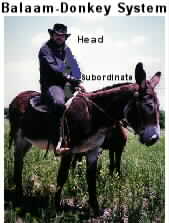
THE SYSTEM
Balaam and his donkey make up a system.5 A system is a group of personnel, material, equipment, and procedures which combine to accomplish a specific purpose. Balaam and his donkey are a system. A business is a system. A sports team is a system. A teacher and class is a system. A system may provide freedom or slavery. Freedom exists only under authority. A Client Nation is a system that is designed to operate under authority and provide freedom for its citizens. A dictatorship is a system of tyranny. A business operates under the authority of management to provide freedom to employees who operate within the boundaries of that authority. In marriage, the husband has the authority and the wife receives freedom within the boundaries of that authority. Freedom can only exist under authority, and there is no authority except from God.
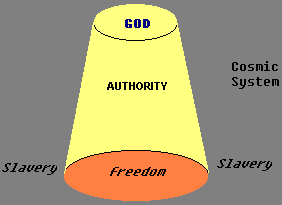 Within
Balaam's system, his faithful donkey began behaving strangely. Rather
than being sensitive to the problem and trying to understand the animal's
behavior, Balaam in his arrogance assumed it was the donkey's fault and
struck her with a stick. This demonstrates poor leadership on Balaam's
part because he failed to love and respect those under his command.
In this case, the donkey was under his authority. Balaam, however,
became angry and acted like a tyrant. Similar situations exist between
management and employees in a business or between husband and wife in marriage.
Within
Balaam's system, his faithful donkey began behaving strangely. Rather
than being sensitive to the problem and trying to understand the animal's
behavior, Balaam in his arrogance assumed it was the donkey's fault and
struck her with a stick. This demonstrates poor leadership on Balaam's
part because he failed to love and respect those under his command.
In this case, the donkey was under his authority. Balaam, however,
became angry and acted like a tyrant. Similar situations exist between
management and employees in a business or between husband and wife in marriage.
When a subordinate exhibits strange behavior, it represents a problem with the system. The fault may lie with management, equipment, material, procedures, or employees. To automatically assume that it is the fault of the employee is a demonstration of insensitivity. Conversely, for employees to automatically assume that problems are due to poor management, may be true; but the system has still failed regardless of who deserves the blame. For husband or wife to blame the other is a sign of insensitivity because regardless of who is at fault, the marriage still has a problem.
A system is like a sports team. Success can come only when everyone does his part. However, failure cannot always be blamed on an individual. Sometimes the techniques, plays, or game plan may be flawed. At other times the coach may have provided inadequate leadership.
THE MARRIAGE SYSTEM
Balaam and his donkey was a system. Marriage is also a system just like Balaam and his donkey, where Balaam is analogous to the husband and the donkey is analogous to the wife. This will perhaps infuriate the women, but considering the current marriage crisis in the world, if this simple analogy cannot be grasped, then the marriage is already doomed. For those men who still haven't gotten the point, they need to understand that the Balaam episode applies to marriage also.
When the wife gets out of line like Balaam's donkey, the husband should avoid acting like Balaam. Hopefully, the male won't be a jackass and beat his wife with a stick, but there are numerous cases of men abusing their wives today. These men are worse than Balaam, who only struck an animal. However, even if the man just wants to blame his wife, he is still acting like Balaam, who blamed his donkey for everything. Husbands, what if the Lord drove your wife away? Have you considered consulting God before behaving like Balaam? What if an angel drove your wife away? How do you know what drove her away? Where are you going to look for answers? If you can't apply Bible Doctrine, then you are no better than Balaam.
Now, to the wives, please look at the donkey's faithfulness. She turned away from danger to save her jackass master from getting them killed. The donkey's eyes were open when her reversionistic master was in a stupor. The donkey saved Balaam's life and was rewarded by verbal and physical abuse; yet, she never rebelled, bit, bucked, or kicked. She faithfully endured harsh treatment from her master. When she talked to her master she was respectful, and the Lord vindicated her faithfulness. Women, if Balaam is riding you, then you better be prepared to think for yourself and take evasive action. And you better be willing to endure unjust treatment. If Balaam is your husband, you are in for cursing. You will have to decide when to turn away and when to stay. You are not expected to submit to criminal abuse; but if you are with Balaam, you will receive unjust treatment. You will have to learn to let the Supreme Court of Heaven handle such cases.
For those of you who think this can never happen to you, you are naive. The Church Age is the intensified stage of the Angelic Conflict. Balaam's problem was with Baal. Baal is just as alive today as he was in Balaam's day. Baal is one of the demons who opposes marriage. The Right Man and Right Woman can easily become pawns of the devil and be trapped by Baal.
Balaam's donkey was allowed to speak to make a point for all of history to remember. The donkey defended herself against a callous and insensitive manager who had no respect for God or God's creation. Those who own animals should understand them. There is no excuse for cruelty to animals. The a fortiori principle is then: Those who are cruel to animals are unfit to lead people. Leaders of people must be sensitive to them because their failures are more often the fault of the system than the employee as taught by Deming, the sage of Quality.
Balaam in his anger, told the donkey he would have killed her if he had a sword. This shows clearly that Balaam did not understand the system that he was using. The system was a transportation system that depended upon the faithful support of his donkey. Balaam lacked systemic perspective. The ultimate put down in history was for a prophet to be challenged by a donkey. The donkey delivered her remarks with the poise of a skilled lawyer: “Am I not your donkey on which you have ridden all your life to this day? Have I ever been accustomed to do so to you?” (Numbers 22:30). Balaam was forced to admit the answer, "No." Thus, the donkey was vindicated, and Balaam was wrong.
Those who lack systemic perspective are as shortsighted and ignorant as Balaam. There is no way to be a part of a team, a business, a marriage, a class, a family, or a Client Nation without systemic perspective. Those who enter into fault finding, denial, and projection are demonstrating lack of systemic perspective. When the system breaks down for whatever reason, there is not only loss of success or prosperity but also loss of freedom. When systems fail, the Cosmic System enslaves.
THE LORD'S REBUKE
It wasn't until the Lord opened Balaam's eyes, i.e. revealed Himself to him in the form of an angel, that Balaam awoke. The angel of the Lord was a preincarnate manifestation of the Lord Jesus Christ. The Lord was standing in Balaam's path with a drawn sword in hand. The sword was a symbol of capital punishment from the Supreme Court of Heaven. Balaam in his reversionism was on the way to the sin that would terminate in his death (1 John 5:16), and the Lord was revealing to Balaam his danger.
The Lord defended the donkey and pointed out Balaam's guilt. He explained to Balaam that the problem with the system was that Balaam was advancing in opposition to the Lord. The reversionist is the "enemy of the cross" (Philippians 3:18). Balaam in reversionism was not executing the Plan of God. He was fulfilling his own lusts. The Lord caused the problem with Balaam's donkey. He even performed a miracle by enabling the donkey to talk. Still Balaam did not understand that he was advancing contrary to the will of God and headed for severe judgment. Balaam was willing to entertain the thought of cursing God's chosen people because he was in reversionism. The reversionist is concerned about himself and his own lust - not the Plan of God. Balaam in reversionism loved money - not God.
![]()
![]()
Last Revision: September 4, 2002 - Revised May 5, 2015
Author: Larry Wood
| Top | Author | Comments | Home |